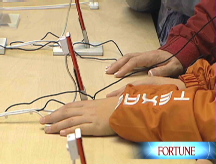Here it is. Now, you design it!
Innovative companies, says a business guru, must learn to collaborate with customers on unique products.
(Fortune Magazine) -- The Times of London calls C.K. Prahalad "the No. 1 most influential management thinker in the world." I wouldn't argue. And he's about to contribute another important idea to business.
The buzzword you'll be hearing and using a lot more is "co-creation." It's the latest addition to the Prahalad lexicon, which you're already employing, perhaps without knowing it. If you've ever talked about "core competencies" or "strategic intent" or "the fortune at the bottom of the pyramid," you're using terms he invented (with Gary Hamel in the first two cases). Co-creation is a key concept in his just published book, "The New Age of Innovation," written with M.S. Krishnan; Prahalad and Krishnan are professors at the University of Michigan's Ross School of Business.
The idea is that the most successful companies no longer invent new products and services on their own. They create them along with their customers, and they do it in a way that produces a unique experience for each customer. The important corollary is that no company owns enough resources - or can possibly own enough - to furnish unique experiences for every customer, so companies must organize a constantly shifting global web of suppliers and partners to do the job.
Those ideas beg for examples. The starkest involve the Internet. Facebook isn't a product or a service, but rather a platform on which users create their own unique experiences; since it opened itself to software applications created by outsiders a year ago, more than 20,000 have appeared. Facebook (estimated value: $15 billion) couldn't possibly do all this on its own. The whole user experience is co-created.
Another example: the iPod. Apple (APPL) invented the device, but users create their own experiences by loading it with music, TV shows, podcasts, and other independently created content, some of which exists because the iPod is available for it. Apple makes deals for some of the content, which it couldn't create on its own, to be available through the online iTunes store.
Prahalad and Krishnan also describe a radically different example that suggests even broader possibilities. Suppose the health insurance premiums of a customer with diabetes could be reset continually based on monitoring of that person's vital signs and compliance with a regimen of diet, exercise, and medication. In theory that model is possible today, and an early version is being used by ICICI Prudential in India. The service and what it costs are continually co-created by the customer and the company in conjunction with a network of doctors, exercise facilities, and pharmaceutical firms that have joined the project.
If that sounds like the old mass-customization idea, it decidedly isn't. That concept was about a company's offering customers many choices on a wide range of product or service attributes, but the company still had to decide which choices to offer and then deliver them. In cocreation the choices are infinite, and the company neither imagines nor delivers them all. Similarly, if this sounds like Web 2.0, it sort of is, but it's much bigger, since it's more than an Internet phenomenon.
The challenges are clear. Most companies, especially old ones, are organized exactly wrong to capitalize on cocreation. They're built around the processes of creating products and services and managing owned resources - just the opposite of the skills needed in the new model. In the same way, most managers (especially old ones) lack an intuitive feel for the way the new model works.
An even greater challenge, which Prahalad and Krishnan don't address directly, is simply imagining where we go next. After all, we're talking here about the latest effects of the megatrend of our time: ubiquitous, ever cheaper infotech. The trend has been apparent for decades, yet seeing very far into where it will lead has been almost impossibly hard. It may well be that the most valuable quality in a businessperson today is fearless imagination. That trait will always be scarce. For now, as a look just slightly into the future, Prahalad and Krishnan's vision will do nicely. ![]()
-
 The retail giant tops the Fortune 500 for the second year in a row. Who else made the list? More
The retail giant tops the Fortune 500 for the second year in a row. Who else made the list? More -
 This group of companies is all about social networking to connect with their customers. More
This group of companies is all about social networking to connect with their customers. More -
 The fight over the cholesterol medication is keeping a generic version from hitting the market. More
The fight over the cholesterol medication is keeping a generic version from hitting the market. More -
 Bin Laden may be dead, but the terrorist group he led doesn't need his money. More
Bin Laden may be dead, but the terrorist group he led doesn't need his money. More -
 U.S. real estate might be a mess, but in other parts of the world, home prices are jumping. More
U.S. real estate might be a mess, but in other parts of the world, home prices are jumping. More -
 Libya's output is a fraction of global production, but it's crucial to the nation's economy. More
Libya's output is a fraction of global production, but it's crucial to the nation's economy. More -
 Once rates start to rise, things could get ugly fast for our neighbors to the north. More
Once rates start to rise, things could get ugly fast for our neighbors to the north. More








